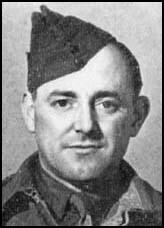George Starr

George Starr was born in England. During the Second World War Starr joined the Special Operations Executive (SOE). Given the code name "Hilaire" Starr was sent to France in November 1942. Posing as a retired Belgian mining engineer who had become rich in the Congo. This helped to explain his unusual accent and the large sum of money he appeared to have without employment.
Based in Périgord, he was in a position to spy on the 11th Panzer Division stationed near Bordeaux. His group also managed to put telephone lines and power stations out of order for many days at a time.
In 1944 Starr established the Armagnac battalion in Toulouse in preparation for the D-Day landings. He had the task of organization, arming, and training of those willing to fight the German Army. One of his greatest achievements was to persuade communist and anti-communist members of the French Resistance to work together.
After the war Starr was awarded the Croix de Guerre, Legion d'Honneur and the Military Cross.
Primary Sources
(1) M. R. D. Foot, SOE in France (1966)
When Bertaux returned to Toulouse he found George Starr practically in control of the place. Ayer, who was there when de Gaulle came on tour on 16 September, reported that "there is a legend in Toulouse that the Germans in 1943, already believed (Starr) to be a British General sent in to direct the whole of Resistance in the South West. At the time of the Liberation, the whole of the area was in the hands of a series of feudal lords whose power and influence was strangely similar to that of their fifteenth century Gascon counterparts. Among these barons (Starr) was, without any question, the most influential.'
But Starr had to leave shortly thereafter, after a memorable row with General de Gaulle. The general asked the agent what the devil he had been up to, and - little understanding the origins of his own power, or the circumstances that had brought him to Toulouse in triumph - denounced Starr as a mercenary and all his followers as mercenaries as well. When Starr pointed out that many of his followers held French commissions, this only made the general angrier still; and this anger left Starr in no mood to remark that he had conducted Wheelwright under Koenig's orders and in strict loyalty to the man who was now denouncing it. When de Gaulle ordered him to leave immediately, Starr replied that he could not recognise him as his commander, and must refer the point to the allied high command; moreover his local responsibilities were not such that he could divest himself of them in five minutes. To the threat of arrest Starr quietly replied that he was at the general's disposition; well knowing that nobody in Toulouse would lift a finger to touch himself. A dead silence followed. Starr's bravery had made its impact on de Gaulle, who rose, came round the desk he sat at, and shook Starr's hand.
(2) Yvonne Cormeau, a wireless operator with the Wheelwright Network, was interviewed by Darlow Smithson for the BBC2 television series, Secret Agent.
My boss was Lieutenant Colonel George Starr. His code name was Hilaire and he had been in France since November 1942, organizing his circuit, setting it up and finding the people. When he asked for a radio operator, he made it a condition, owing to the recruiting by the enemy of young men for obligatory labour in Germany, for someone over the age of thirty-five to be sent out. London's answer was to send him a woman. He must have cursed!
It was a completely different kind of life to what I had lived before and I must admit to butterflies floating in my tummy all the time. You had to be very careful, with eyes in the back of your head as well as in front. We didn't want people to know much about what I was doing but those who offered me a roof and offered me food always knew that I'd come from England and that I had a wireless set. They were asked beforehand, "Would you take a radio operator?" because that, more than anything, doubled the danger for them. And I'll give it to these people, not once was I refused accommodation. As the area was quite big, I would stay three nights, at the most, in one house.
In a way, I was left to my own devices in whatever house I was in. I tried to help with the housework, it was about all I could do. First of all, I took the cover of looking after the children or something like that to enable the women to go to work in the fields when their husbands had gone. But moving around so much, that became too difficult and then I tried to be a district nurse with my bike, going about the countryside on a bike. That worked very well. At other times, there had to be another cover, because I was going to spend about five days in one place, simply because I had toothache and therefore two visits to the dentist had to be covered.
